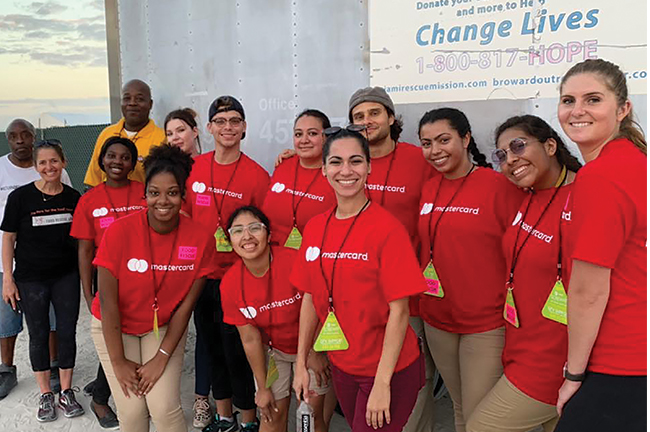The amount of food and water wasted at meetings and events is staggering, to say the least.
“Planners probably don’t realize that the water footprint for 750 attendees for a conference program, tote bag and two cups of coffee could fill an Olympic-sized swimming pool,” said Jane Scaletta, president of Orlando event company Dolfin Destinations, to help participants visualize the meetings industry’s impact on the environment.
Last November, the Florida & Caribbean Chapter of SITE (Society of Incentive Travel Excellence) hosted an event on sustainability for the meetings and incentives industries to try to stem the flow from kitchen to landfill.
Scaletta has long been passionate about sustainability and knew the chapter’s board was ready to spread the word about recycling and food rescue at events.
At the SITE Chapter seminar there was much discussion about the ISO 2021 guidelines and United Nations Sustainability Development Goals. Included were International Standards to promote social sustainability by helping countries and communities improve the health and well-being of their citizens.
They covered all aspects of social welfare, including the following:
- Healthcare systems and related products related to social inclusion and accessibility.
- Helping businesses and countries manage their environmental impact by implementing an environmental management system.
- Measuring and reducing greenhouse gas emissions and energy consumption.
- Encouraging responsible consumption.
How to Reduce Food Waste at Meetings and Events
Scaletta said there are a variety of ways to reduce food waste at meetings and events.
“We have a step-by-step food rescue plan for event managers and planners to help alleviate food waste, and it starts with negotiating contracts with hotels and other venues on what to do when food is left over after an event,” she said.

Aeroponic Towers, Centerplate (OCCC)
John Buschman, Ph.D., a lecturer at Florida International University’s Chaplin School of Hospitality & Tourism Management in North Miami, also spoke at the SITE sustainability event. He noted that a 15 percent reduction in food waste in the U.S. could feed as many as 25 million people.
Buschman has been championing sustainability for the past 10 years, since he first saw food being thrown out after the South Beach Food and Wine Festival, hosted by Florida International University.
“In 2006 it rained during one of the festival’s biggest events; there was an enormous amount of food left over and our student volunteers insisted something had to be done with it,” Buschman said. “In subsequent years we got more organized, connected with food banks and created a system. The first year we rescued about 3,000 to 4,000 pounds of food, but at our peak we rescued as much as 40,000 pounds of usable nutrition and other supplies from the four-day festival!
“Since reaching that peak we’ve learned how to cut our waste in half and deliver the other, unused half to places like Miami Rescue Mission, which serves 1,900 meals a day,” he said.
Resources to Combat Food Waste
Buschman recommends tools such as the Sustainable Events Network, Florida & Caribbean’s https://senfc.org and American Hotel and Lodging Association (AHLA)’s www.hotelkitchen.org to planners.
The Sustainable Events Network, Florida & Caribbean website provides a handy one-page guide to help planners create their own plan for rescuing food as well as a video that walks planners through a case study of the annual NACE event. The AHLA website is a broader effort financed through World Wildlife Fund (WWF) with support from The Rockefeller Foundation, and aims to work with the hospitality industry to understand and reduce food waste.
Hotelkitchen.org states its goal is to “change the flow of food, cutting food waste in hotel kitchens to protect the planet, and fight hunger while providing the ultimate guest experience.” This website includes videos on training hotel staff to cut waste, a toolkit on planning a food waste-management journey, resources and case studies.
One case study demonstrates how Hyatt has educated staff in reducing food waste.
The Hyatt Regency Orlando, for example, participated in a three-day exercise to redesign the standard hotel buffet under the leadership of its executive chef and with support from the hotel’s senior director of events.
“Hyatt Corporate is working on making this a worldwide initiative, but there are so many moving parts that it cannot happen overnight,” said the Hyatt Regency Orlando’s senior director of events, Cornelia Jung. “We are starting with implementing small steps and working up to do more over time.
“As the largest hotel in the company, we face these food waste issues on a daily basis, so we were thrilled to be asked to participate and be a part of a think tank working to efface these issues,” she continued. “Internally, we started to do little things, such as focus on smaller portions and replenish only as needed. We are very conscious that items that hit a buffet table cannot be reused, so we don’t put too much food out in order to reduce waste.”
The WWF Food Waste team visited Hyatt Regency Orlando to observe and audit a large buffet-style lunch event. The team’s recommendations had a noticeable impact on the chef’s and kitchen staff’s meal production procedures. The hotel team decreased its standard production rate by 25 percent per event. Additionally, by using a “just in time” mindset to analyze the first-day orders by attendees of the same multi-day meeting, the hotel team could better prepare meals and portions for later days to meet those guests’ specific preferences.

Sustainability Food Rescue, Miami
Good Planning Cuts Food Waste
“If you look at the literature from the American Hotel & Lodging Association, or the National Restaurant Association, the first line of defense in reducing food waste is better planning,” Buschman said. “If you predict how much and what type of food we need to produce in an ideal world, there wouldn’t be one grain of rice left over. We know that’s never going to happen because all planners want to be careful not to run out of food and every event is different. The second line of defense against food waste is to have a plan to recover anything that is recoverable.”
Buschman suggests meeting planners connect with homeless shelters to help them meet their food needs. He also notes that food no longer safe for human consumption (like scraps on a buffet) can still be salvaged for good use.
The Broward County Convention Center, for example, sends its scraps to a pig farm. Disney ships its leftovers to the Harvest Power plant (between EPCOT and Animal Kingdom), a $30 million energy garden that processes about 350 tons of food waste per day, turning food waste into electricity that helps power the resort and its rides.
Convention Center Sustainability
Centerplate, the catering company for Orlando’s Orange County Convention Center, also contributes to the center’s overall waste diversion through its own comprehensive organic recycling program. Organic (food) waste is collected and taken to Harvest Power, where it is converted into clean energy.
Centerplate is so committed to its sustainability efforts that the company has a director of sustainability, Molly Crouch.
Crouch works directly with a variety of local organizations to donate leftover food from the Miami Beach Convention Center, Orlando’s Convention Center, the Florida State Fairgrounds and Hard Rock Stadium.
At a recent conference for the Produce Marketing Association’s Fresh Summit, a quarter of a million pounds of food was donated to Second Harvest Food Bank in Orlando.
“We donate to Second Harvest Food Bank and other food pantries to help Central Florida residents in need,” Crouch said.
Centerplate also grows its own food in Orlando with the help of 81 aeroponic towers, an urban agriculture trend considered much more economically sustainable than traditional farming because it uses up to 95 percent less water.
“The vertical tower design also reduces overall land use by using up to 90 percent less land space while growing plants three times faster,” Crouch said.
Basil, oregano, thyme and lemongrass, among other hearty plants, are grown all from non-GMO seeds, and because nothing is processed, Crouch said, there are no chemicals, salmonella issues or pest control issues.
“We grow full plants from seed to maturity in four weeks,” she said. “We can do a lunch for 200 to 300 people with the plants we have.”
Because many of the shows that come to the OCCC are repeat customers, Crouch said they have a history of how much food a group needs.
“We sit down with clients and talk about our goals,” she said. “We don’t want to run out of food, but we talk about aggressively breaking down buffets, or only putting food out as people arrive. We don’t preset water or iced tea, and people appreciate it because they’re becoming much more aware. I find the tide is turning.”
Other Florida Sustainability Standouts
These Sunshine State hospitality industry professionals and companies are chipping in to reduce the waste associated with hotel stays and meetings and conventions:
- Joanna Berens, president of Joanna Berens Hospitality and food rescue chair for Sustainable Events Network, Florida & Caribbean, partnered with MPI and hospitality student interns from C2C (Connections to Careers) at the MPI Sunshine Education Summit at the Sawgrass Marriott in Ponte Vedra Beach in August. The team packed up all viable prepared food from the three-day conference as well as food from other programs and delivered it to Dining with Dignity of St. Augustine and BEAM of Jacksonville Beach. The University of North Florida’s Food Fighters (a student-led group of food rescuers) successfully “rescued” 82 trays of valuable nutrition and redistributed it to homeless and food-insecure members of local communities.
- “We couldn’t have done it without Bryan Day, event services manager, and chef Edgar Maldonado, of the Sawgrass Marriott, both of whom were instrumental in making sure our food rescue mission was a resounding success,” Berens said.
- The St. Augustine Amphitheatre, a Green Hands venue, upgraded all aspects of its operation to reduce its carbon footprint. The amphitheatre offers water-refilling stations, increased opportunities for guests to recycle, installed LED lights throughout the facility and even features a garden and compost program. Food service for the musicians includes fruits and vegetables grown on-site.
- Rosen Hotels & Resorts converts used cooking oil into biodiesel fuel to power its maintenance vehicles and golf course equipment. The company also announced plans to phase out the use of plastic straws in over 26 of its restaurants and in-room dining at eight hotels by the beginning of next year.
- Walt Disney World Swan and Dolphin Resort offers guests the chance to decline housekeeping to help conserve resources. The hotel rewards these guests with a $5 food and beverage voucher, or 500 SPG Starpoints, for each day housekeeping is declined.



